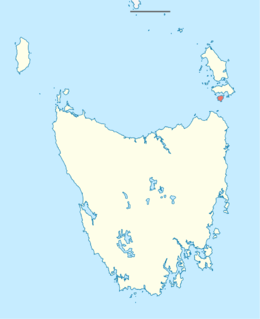Clarke Island, Tasmania
| Native name: Lungtalanana Island | |
|---|---|

Lying below Flinders Island and Cape Barren Island is Clarke Island. The large land mass at the bottom left corner is Tasmania.
|
|

Clarke Island (Tasmania)
|
|
| Geography | |
| Location | Bass Strait |
| Coordinates | 40°32′06″S 148°10′12″E / 40.535°S 148.170°ECoordinates: 40°32′06″S 148°10′12″E / 40.535°S 148.170°E |
| Archipelago | Furneaux Group |
| Area | 82 km2 (32 sq mi) |
| Area rank | 8th in Tasmania |
| Highest elevation | 206 m (676 ft) |
| Administration | |
|
Australia
|
|
| State | Tasmania |
| Demographics | |
| Population | 1 (2009) |
The Clarke Island (also known by its indigenous name of Lungtalanana Island), part of the Furneaux Group, is an 82-square-kilometre (32 sq mi) island located in Bass Strait, south of Cape Barren Island, approximately 24 kilometres (15 mi) off the northeast coast of Tasmania, Australia.
Off its west coast lies the shipwreck of HMS Litherland, which sank in 1853 and was discovered in 1983. Clarke Island is Tasmania's eighth largest island. The island is privately owned by Connor Bradley.
On 28 February 1797, Sydney Cove, en route from Calcutta to Port Jackson, sailed into Banks Strait in strong winds and ran aground between Preservation Island and Rum Island. A party of seventeen men set off on 28 February 1797 in the ship's longboat to reach help at Port Jackson, 400 nautical miles (740 km) away. This was led by first mate Hugh Thompson, and included William Clark the supercargo, three European seaman and twelve lascars. Ill fortune struck again and they were wrecked on the mainland at the northern end of Ninety Mile Beach. Their only hope was to walk along the shore all the way to Sydney, a distance of over 600 kilometres (370 miles).
They had few provisions and no ammunition, and fatigue and hunger lessened their number as they marched. Along the way they encountered various aboriginal people, some friendly and some not. The last of the party to die on the march was killed by a man Dilba and his people near Hat Hill. Those people had a reputation around Port Jackson for being ferocious. Matthew Flinders and George Bass had feared for their safety when they encountered Dilba the previous year.
...
Wikipedia
